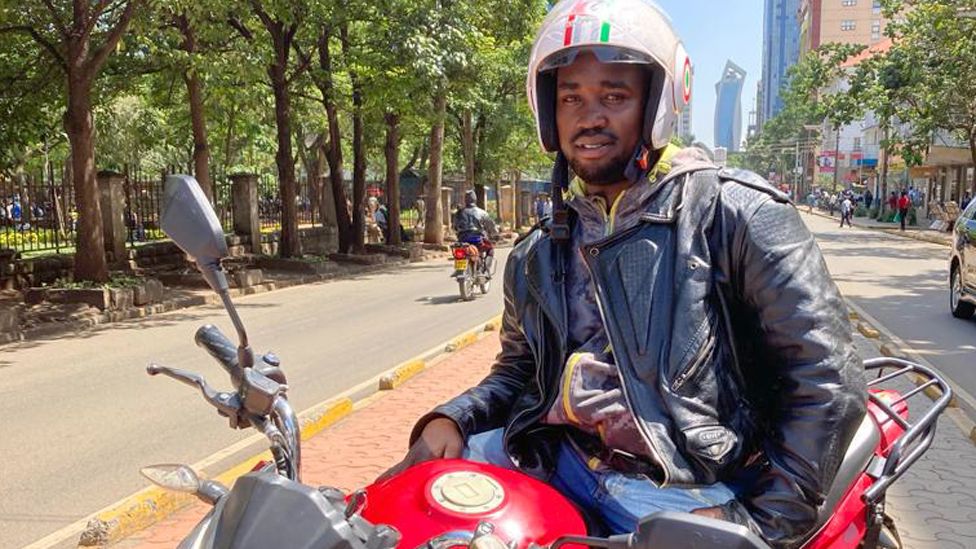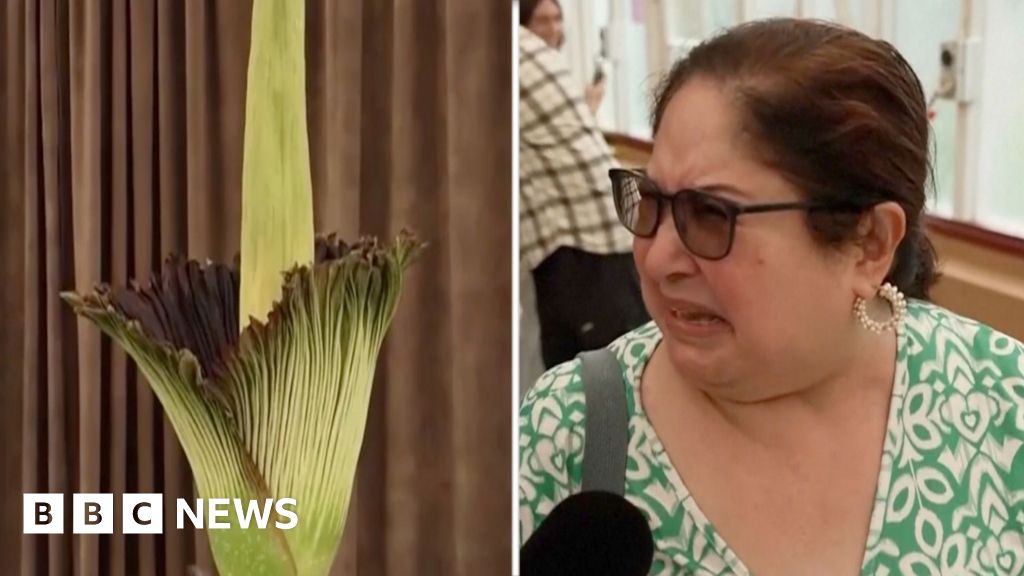ARTICLE AD BOX
 Image source, BBC/Paa Kwesi Asare
Image source, BBC/Paa Kwesi Asare
By Paa Kwesi Asare
BBC News Komla Dumor Award winner
Moses Lugalia has joined Kenya's budding electric vehicle revolution - by exchanging the noisy roar of his petrol motorbike for the gentle hum of an electric one.
The biggest incentive to go electric for the 27-year-old rider of a motorbike taxi - known locally as a "boda-boda" - was the promise of saving money at a time when fuel prices keep rising.
Motorbike taxis are everywhere in Kenya, as in many African countries, because they are cheaper than cars, and can be better for navigating the notorious traffic jams in the capital, Nairobi.
Mr Lugalia has been in the motorbike taxi business for five years, transporting people and goods around Nairobi.
He would spend about 1,000 Kenyan shillings a day - just over $6 (£5) - on fuel when he used a petrol bike.
Nairobi drivers earn on average about $10-15 a day, according to the country's Boda-Boda Association.
Since going electric, Mr Lugalia says he spends no more than $1.42 a day - so his profits are now up and that makes him very happy.
"Because of the cost of petrol, I am able to save a lot more using my electric bike," says Mr Lugalia with a smile.
Instead of filling up with petrol, Mr Lugalia now swaps the bike's electric battery once, sometimes twice, a day at one of the growing number of swap stations in Nairobi. A fully charged battery will allow him to drive for about 80km (50 miles), almost a whole day's work.
"Electric is the future in Kenya," Mr Lugalia tells the BBC.
The Kenyan government thinks so too. President William Ruto launched a national "e-mobility" programme on 1 September 2023.
Motorbikes and three-wheeled tuk-tuks, or auto rickshaws, are the centrepiece of a move to make transport green and reduce air pollution.
The government hopes the prospect of cheaper running costs will create a gearshift in the minds of other drivers of the ubiquitous boda-bodas, most of whom still use petrol or diesel.
Image source, BBC/Paa Kwesi Asare
Image caption,Boda-bodas are one of the most common ways to get around Nairobi
There are about three million boda-boda riders in Kenya, according to the transport minister, and the UN estimates some five million people benefit from their incomes.
Taking a boda-boda is a convenient, fast and cheap way to get around.
But many of the motorcycles are old, poorly maintained and big polluters. Although they produce less carbon dioxide than cars, they release more nitrogen oxides and hydrocarbons - which affect air quality and the climate.
Nairobi is one of the world's most heavily congested cities. Its population swells from about 4.5 million to more than six million people during rush-hours.
The daily gridlock can be a choking nightmare for commuters - transport accounts for about 40% of Nairobi's air pollution, and globally for about 20% of greenhouse gas emissions, according to the Clean Air Fund.
Other major climate change culprits are deforestation, agriculture, manufacturing, and the open burning of waste.
Africa contributes only 2% to 3% of global greenhouse gas emissions, but it suffers disproportionately from climate change, according to the UN Environment Programme.
Nevertheless, Kenya's government sees a shift to green transport as vital to help meet its climate goals. It wants more than 200,000 electric bikes on the road by the end of 2024.
On average e-bikes emit 75% less total greenhouse gases.
So far only about 2,000 boda-boda drivers have switched from petrol to electric.
Image source, Getty Images
Image caption,Boda-bodas can be the quickest way to navigate Nairobi's notorious traffic jams
In many ways, Kenya is an ideal market for electric motorbikes. About 85% of its electricity is renewable, generated by hydro, solar, geothermal, and wind.
Kenya has experienced some devastating droughts in recent years - which affects hydro-power - but there is significant room to grow its geothermal, solar and wind capacity.
A handful of Kenyan start-ups have taken advantage of this and set up shop in the past three years, manufacturing, designing, assembling and selling electric motorcycles.
They are also teaming up with creditors to offer cheap loans, which is the only way boda-boda drivers can afford to buy their own vehicles.
Mr Lugalia sold off his old petrol bike and used some of the proceeds to make a down-payment for an electric bike - and then paid the rest of the $1,500 in daily instalments over a year.
He now owns the bike outright - but not the battery.
"That wouldn't make economic and business sense," says Steve Juma, the co-founder of electric bike company Ecobodaa, as the battery is the most expensive part of an electric bike.
It would almost double the cost.
So sellers retain ownership of the battery and have set up about several hundred battery-swap points in the capital - in shopping malls, petrol stations and fast food outlets.
Mr Lugalia says he has no trouble finding a place where he can swap over batteries. Using an app on his phone, he can open a cabinet, place his spent lithium battery into an empty locker, and take out a fully charged one from another locker.
But if you go beyond the city, it is a different story - and that is a huge disincentive for most boda-boda drivers I spoke to when I was in Nairobi.
"You can't go to a remote area where there is no charging system for the battery," one man said, explaining why he was not yet ready to go green.
While others said they did not want electric bikes because of the perception that they were more expensive to buy than petrol ones. And others say the range of an electric bike - between 60 and 80km - is too limiting.
The government, however, sees a future where all Kenyan streets echo with the quiet hum of e-motorcycles and wants to eventually phase out traditional boda-bodas altogether.
There is still a long way to go, given how limited the electric vehicle infrastructure is beyond Nairobi.
Image source, AFP
Image caption,There are already some initiatives to cut emissions on Nairobi's roads
But the government says the private sector, which is already investing in Nairobi, can play a pivotal role elsewhere too.
"We are confident that if we succeed in establishing proper infrastructure in Nairobi, that will encourage the same investors to invest," Kenyan Cabinet Secretary for Roads and Transport, Kipchumba Murkomen, told the BBC
Some companies have already announced ambitious plans.
Masalule Kituyi of Roam says the company will be producing 8,000 electric motorcycles by next year.
Spiro, which operates in Kenya, Benin, Togo, Rwanda and Uganda, plans to set up 3,000 battery-charging and swapping stations across Kenya.
And by the end of 2024, another Nairobi-based start-up, Arc-Ride, wants to build 1,000 electric vehicles and set up more than 300 battery stations in Nairobi.
Women drivers only make up 1% of the industry, but Arc-Ride believes electric bikes might attract more into the business. It has approached some to test-drive its new e-boda motorcycles - including Carol Kamal.
She studied journalism but cannot find a job in that field, so turned to boda-boda driving.
She was so impressed by the electric boda-boda's efficiency and quietness that she's now saving up to go electric.

 1 year ago
20
1 year ago
20








 English (US) ·
English (US) ·